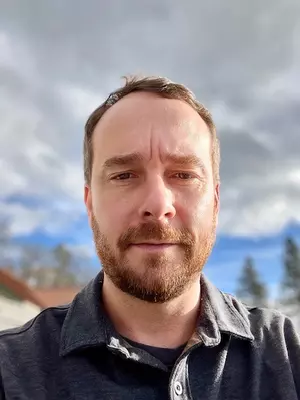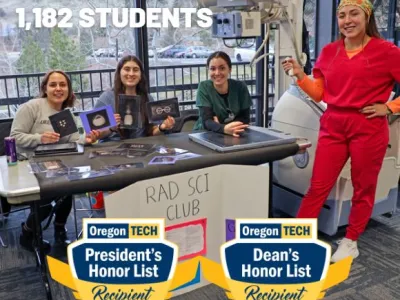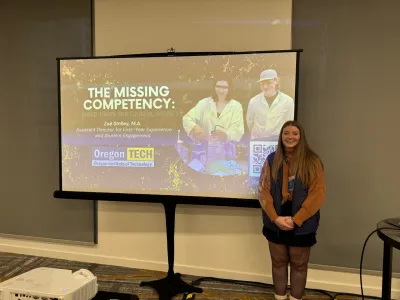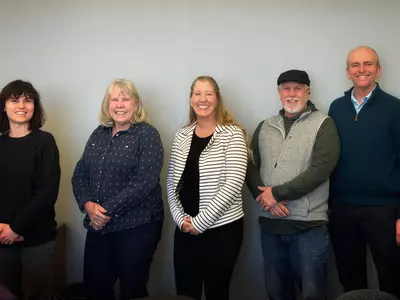
Oregon Tech/OHSU Paramedic program
The Oregon Tech/OHSU Paramedic program—a nationally recognized leader in Emergency Medical Services (EMS) education —continues its path to success by welcoming Adam Wagner, longtime EMS professional, as the new director of the program since July.
Wagner plans to sustain and expand on the success of the program achieved most recently by former director Jamie Kennel. Wagner hopes to learn from the past, focus on increasing nationwide partnerships that provide a pathway for student experience, and involve more students in research opportunities.
“I am proud of the adaptations that we have worked through in this pandemic. During this time, we were also able to collaborate with the OHSU School of Medicine and pair students with doctors in their clinical environments while other programs closed,” explains Wagner, who has taught at Oregon Tech for more than a decade. “The program is a well-oiled machine, and we have a great foundation that other directors have maintained and improved upon over the years. Once the pandemic subsides, I would like to establish a more extensive internship network. The internship experience begins at the culmination of didactic and clinical work and involves 480 hours with vetted paramedics in the field. We currently have quite a bit of opportunity in the region, but I would like to see that expand to other parts of the country.”
Initially beginning his career working on emergency calls in Missoula, Montana, while completing his undergraduate degrees at the University of Montana, Wagner has been working in EMS for 17 years. He had various experiences as a paramedic nationally and internationally and worked as a lead instructor with the Wilderness Medicine Institute for five years leading up to his employment at Oregon Tech. This formative experience allowed him to work with various cultures and teaching environments around the world.
Wagner shares, “I recall fighting off baboons to reach a classroom in the Himalayas and working through sociocultural complexities to deliver lesson plans in Malaysia. Since then, I have been able to hone my skills as a teacher at Oregon Tech.”
Throughout the leadership of former director Kennel and now Wagner, the Oregon Tech/OHSU paramedic faculty have taught their students the importance of meeting patients where they are and not going into situations with preconceived notions. Part of this education includes expanding access to EMS education to unrepresented communities, bringing more diverse perspectives and backgrounds into the profession of first responders.
“There is nothing like being front and center in an emergency, perhaps the worst day of the patient’s life, and doing your best to turn that around for them,” said Wagner. “We are in the field meeting cultural and ethnic disparities, working with patients in their environments. It is a humbling experience that promotes tremendous growth.”
Oregon Tech/OHSU’s Paramedic program focuses on managing infield emergencies, critical thinking, clinical assessment, procedural expertise, and crew resource management skills while working as part of an interdisciplinary patient care team. Students within the program also gain hands-on experience working with some of the program’s nearly 40 industry partners, such as Tualatin Valley Fire & Rescue, one of the most progressive EMS agencies in the country.
The program has educated paramedics for nearly 50 years, and Wagner explains that one of the biggest strengths is the quality of the students who attend.
“This is a destination program, and it is evident in the students and faculty that we have attracted from various states (even Canada),” he says. “We wouldn’t be able to pull in high-quality students if our core faculty weren’t delivering to match the expectations. We have a team with a diverse background in EMS and higher education.
“On a broad note, I also feel strongly about how this profession is viewed and understood. We are a young profession that has grown considerably over the last 70 years. We have gained substantial responsibility and autonomy to provide advanced care for patients while getting them to their destination. Nationally, we are just now starting to consolidate large amounts of data that can be used for research in the prehospital environment.”
Wagner recently received a Master of Science in Public Health from the London School of Hygiene and Tropical Medicine. “I am excited to put this to use and involve students in research projects that can contribute to evidence-based practice while elucidating the profession to the medical community at large,” he says.
Wagner continues to teach within the program, even as he dedicates time to leading it. “A lot of our faculty, including myself, insist on being identified as a teacher first and a paramedic second. This now applies even more to me since I still need to prioritize time with our students to know how better I can serve as their director,” he says.
For more about the Paramedic program, go to www.oit.edu/academics/degrees/paramedic-program.
###









